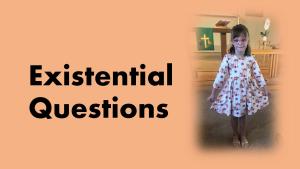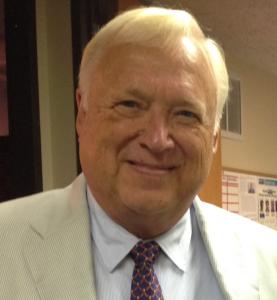Asking Google Existential Questions
 What happens when you ask Google to answer your existential questions?
What happens when you ask Google to answer your existential questions?
First, we can thank Google for asking existential questions for us. We can find lists of existential questions as low as 3 long and as high as 200+ long. Try “Immanuel Kant’s 3 Fundamental Existential Questions” as well as “200+ Deep Existential Questions for the Deepest Conversations Ever”.
Second, Google along with its amanuensis, a chatbot (ChatGPT), can answer those existential questions.
Whew! That was easy.
Or was it?
What is an existential question again?
 What is an existential question again? In case you’re wondering, an existential question has to do with existing. “To be or not to be? That is the question,” exclaimed Shakespeare’s Hamlet.
What is an existential question again? In case you’re wondering, an existential question has to do with existing. “To be or not to be? That is the question,” exclaimed Shakespeare’s Hamlet.
“Being-toward-death,” is Martin Heidegger’s (1889-1976) way of putting it. In our “everydayness” — crowded with games to play, appointments to keep, cell phone screens to watch, and endless conversational twaddle — we get busy. When busy, we cover over or even forget that death marks the end of our existence. Then in the middle of the night we wake up to realize that our own death is really serious. At that moment, we start to ask existential questions.
On most of Google’s lists we find existential questions such as these:
Does God exist?
Will I die today in a school shooting?
Will I ever find a soulmate?
Is a hotdog a sandwich?
The answer to the question of being-versus-nonbeing, said theologian Paul Tillich (1886-1965), is God. When God is understood as the ground of being, we understand the meaning of life.
“Only those who have experienced the shock of transitoriness, the anxiety in which they are aware of their finitude, the threat of nonbeing, can understand what the notion of God means” (Tillich, 1951-1963, pp. 1: 61-62).
Now, do you understand the assignment?
Two Forms of the Question of Being
One formulation of the core existential question has to do with the world. Why is there something and not nothing? The world is contingent. It’s possible that it might not exist. Yet, it does. Amazing! The existence of our world just missed not existing. Amazing!
 Related to this is the future of Planet Earth. When our young people ask whether they will have a future on this planet, they worry about their own existence. They watch while the senior generation becomes intoxicated with consuming gargantuan amounts of fossil resources and spewing polluting poison into the atmosphere. Soon Mother Earth will cough and sputter. She’ll no longer be able to suckle her young. Earth faces an existential crisis. If Earth dies, we die with it.
Related to this is the future of Planet Earth. When our young people ask whether they will have a future on this planet, they worry about their own existence. They watch while the senior generation becomes intoxicated with consuming gargantuan amounts of fossil resources and spewing polluting poison into the atmosphere. Soon Mother Earth will cough and sputter. She’ll no longer be able to suckle her young. Earth faces an existential crisis. If Earth dies, we die with it.
That’s the first form. It’s the question of being-versus-nonbeing in general.
The second form of the question of being has to do with your and my personal existence. Martin Luther (1483-1546) directs the question to you, for me, or pro me.
You or I might ask: What is the meaning of my life? What is the purpose to which I have been called into existence? And am I performing adequately?
Who am I, anyway? Am I only the person my family thinks I am? Am I the person my friends and bullies online imagine me to be? Or, is there an inner “me” of some sort that I’m somehow commanded to bring to expression?
Existential questions prompt anxiety.
Existential questions don’t have simple factual answers. This makes it hard to understand the assignment. Those who provide simplistic answers too quickly get sus just as quickly.
Existential questions are so personal they beleaguer us with puzzlement, dread, and fear. The best word for this is anxiety. Anxiety is the fear of nothing. Or, more precisely, anxiety is the fear of becoming nothing, of becoming no-thing. Anxiety pervades our psyche with the dark dread of nonbeing.
Try these answers and question on for size.
Patheos blogger Gil Rosado asks the question: why do we exist? Then he lists a variety of answers offerd by the Bible, Hinduism, Buddhism, and secularism. Check out these options.
GTU blogger Marvin T. Brown asks the question: why do we exist? Here’s his answer and a repeat of the question.
Maybe we exist to be each other’s playmates. We certainly need each other to play, to protect, to provide and to love. We exist for each other. That’s a no-brainer. But that doesn’t answer the original question, why do humans exist? Is there a place for us in the larger scheme of things?
What do you think of all this?
Pre-Conclusion
When you toss ‘n’ turn unable to sleep because you’re asking yourself existential questions, take a sleeping pill. Or try clicking on the another Patheos post in this series on existential questions. You might try: “Why am I lost in depression?” or “What happens after we die?”
PT 3603 Asking Google Existential Questions
Patheos PT 3603 Asking Google Existential Questions
Patheos PT 3604 Why am I lost in depression?
Patheos PT 3605 What happens after we die?
Patheos PT 3606 Will I ever find my true soulmate?
Patheos PT 3607 Does God exist?
▓

For Patheos, Ted Peters posts articles and notices in the field of Public Theology. He is a Lutheran pastor and emeritus professor at the Graduate Theological Union. He co-edits the journal, Theology and Science, with Robert John Russell on behalf of the Center for Theology and the Natural Sciences, in Berkeley, California, USA. His single volume systematic theology, God—The World’s Future, is now in the 3rd edition. He has also authored God as Trinity plus Sin: Radical Evil in Soul and Society as well as Sin Boldly: Justifying Faith for Fragile and Broken Souls. See his website: TedsTimelyTake.com. Watch for his new 2023 book, The Voice of Public Theology, published by ATF Press.
▓














